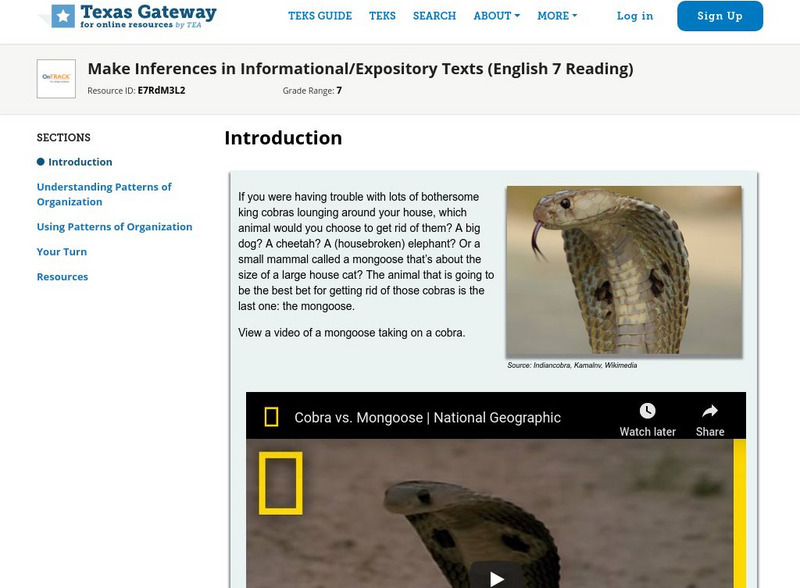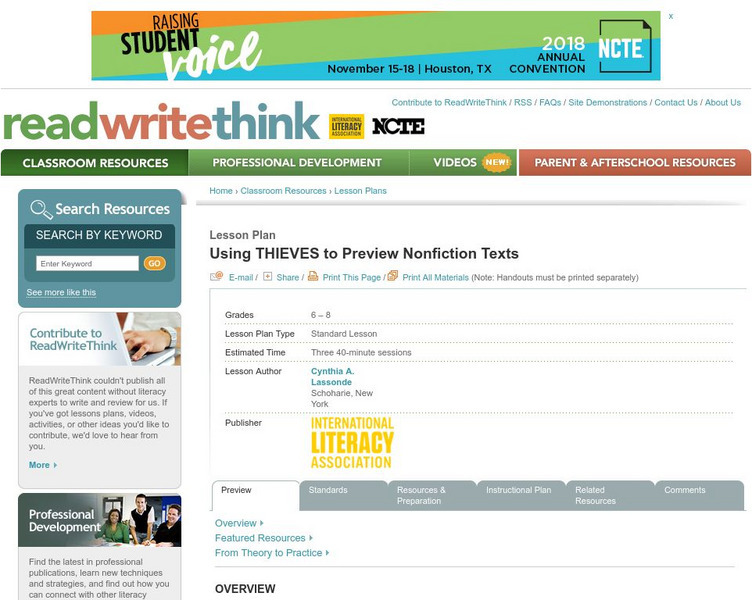Other
English Companion: Reading Expository Text
Taken from "Reading Reminders: Tools, Tips, and Techmiques," the information on this website provides advice on how to read, understand, analyze, and write expository texts.
Reading Rockets
Reading Rockets: Teach Expository Text Structure to Facilitate Comprehension
Expository text can be challenging to young readers because of the unfamiliar concepts and vocabulary it presents. Discover ways to help your students analyze expository text structures and pull apart the text to uncover the main idea...
ReadWriteThink
Read Write Think: Using Narrative for Expository Text
Lesson in which students read various narrative texts which provide a context for them to learn content-area topics. Narratives allow the students to begin to understand expository texts.
Texas Education Agency
Texas Gateway: Synthesize Ideas in Informational/expository Text
[Accessible by TX Educators. Free Registration/Login Required] Learn how to synthesize and make logical connections between ideas within a text and across two or three texts representing similar or different genres and support with...
Reading Rockets
Reading Rockets: Guiding Students: Expository Text With Text Feature Walks
Explains how to guide students in examining text features during a walkthrough of an expository text.
ReadWriteThink
Read Write Think: Exploring How Section Headings Support Understanding
Teaching learners to pay attention to headings and titles as they read? Here you'll find a practical application for using an expository text to apply the concept of using headings. Geared toward older elementary students, but lesson...
Florida Center for Reading Research
Florida Center for Reading Research: Expository Text Structure: Summarizing [Pdf]
A lesson plan in which students read a text and record the main ideas and supporting details on a graphic organizer. Students then complete the organizer by writing a summary of the text. Materials are included.
Florida Center for Reading Research
Florida Center for Reading Research: Expository Text Structure: Main Idea Mania
A lesson plan in which students read a text and record the main ideas and supporting details on one of the graphic organizers provided. Materials are included. [PDF]
Texas Education Agency
Texas Gateway: Synthesize Ideas in Informational/expository Texts
[Accessible by TX Educators. Free Registration/Login Required] Learn how to synthesize and make logical connections between ideas within a text and across two or three texts representing similar or different genres (including literary...
Texas Education Agency
Texas Gateway: Summarize Informational/expository Text (English 7 Reading)
[Accessible by TX Educators. Free Registration/Login Required] Learn how to evaluate a summary of the original text for accuracy of the main ideas, supporting details, and overall meaning.
Texas Education Agency
Texas Gateway: Summarize Informational/expository Text (English 6 Reading)
[Accessible by TX Educators. Free Registration/Login Required] Learn how to summarize the main ideas and supporting details in text and understand that a summary does not include opinions.
Texas Education Agency
Texas Gateway: Synthesize Ideas in Informational/expository Text
[Accessible by TX Educators. Free Registration/Login Required] Learn how to synthesize and make logical connections between ideas within a text and across two or three texts representing similar or different genres and to support the...
Texas Education Agency
Texas Gateway: Make Inferences in Informational/expository Texts
[Accessible by TX Educators. Free Registration/Login Required] Use different organizational patterns as guides for summarizing and forming an overview of different kinds of expository text while distinguishing factual claims from...
Cengage Learning
National Geographic: Informational Text and Young Children [Pdf]
Research-based informative article on when, why and how to introduce and teach reading skills with informational texts to early-elementary students beginning as early as kindergarten.
Florida Center for Reading Research
Florida Center for Reading Research: Expository Text Structure: Just the Facts
A lesson plan in which students read a text and complete a graphic organizer to identify the topic and supporting details or facts. Materials are included.
Florida Center for Reading Research
Florida Center for Reading Research: Keys to the Main Idea [Pdf]
A lesson plan in which learners read a text a complete a graphic organizer to identify the main ideas and supporting details. Materials are included.
Florida Center for Reading Research
Florida Center for Reading Research: Expository Text Structure: Book Look [Pdf]
A lesson plan in which students look through a book to identify text features and complete a graphic organizer. Materials are included.
Florida Center for Reading Research
Florida Center for Reading Research: Expository Text Structure: Research Roundup
A lesson plan in which students complete graphic organizers as they gather research information. Materials are included.
Texas Education Agency
Texas Gateway: Synthesize Ideas in Informational/expository Text
[Accessible by TX Educators. Free Registration/Login Required] In this lesson, you will expand on your ability to read texts, synthesize them, and make choices based on the information you read. Finally, you will learn how to use textual...
Florida Center for Reading Research
Florida Center for Reading Research: Exp. Text Structure: Projected Paragraphs
A lesson plan in which learners read a text and highlight the most important details. Materials are included. [PDF]
Florida Center for Reading Research
Florida Center for Reading Research: Expository Text Structure: Super Summary [Pdf]
A lesson plan in which learners read a text and then complete a graphic organizer to help them write a summary. Materials are included.
ReadWriteThink
Read Write Think: Playing With Genre Through Newspapers and Short Stories
Contains plans for three lessons that ask students to compare narrative writing (short stories) to expository writing (news articles) in order to understand what makes each genre unique. In addition to objectives and standards, this...
ReadWriteThink
Read Write Think: Using Thieves to Preview Nonfiction Texts
Contains plans for three lessons that introduce a nonfiction prereading strategy with the acronym THIEVES, which stands for Title, Headings, Introduction, Every first sentence, Visuals and vocabulary, End Questions, and Summary. In...
AdLit
Ad lit.org: Reading (And Scaffolding) Expository Texts
To help students comprehend expository text structures, teachers can acquaint them with the signal or cue words authors utilize in writing each of the structures and use the graphic organizers offered in this article




![Florida Center for Reading Research: Expository Text Structure: Summarizing [Pdf] Lesson Plan Florida Center for Reading Research: Expository Text Structure: Summarizing [Pdf] Lesson Plan](https://content.lessonplanet.com/knovation/original/509106-80e78b7399a2808435954652f1b4d966.jpg?1661786965)







![Florida Center for Reading Research: Keys to the Main Idea [Pdf] Lesson Plan Florida Center for Reading Research: Keys to the Main Idea [Pdf] Lesson Plan](https://content.lessonplanet.com/knovation/original/509117-6a7deb78ba7b4449647dd19113c6a0f8.jpg?1661786946)
![Florida Center for Reading Research: Expository Text Structure: Book Look [Pdf] Lesson Plan Florida Center for Reading Research: Expository Text Structure: Book Look [Pdf] Lesson Plan](https://content.lessonplanet.com/knovation/original/509120-2284420fedcb16b27a3acf9ff66e58cc.jpg?1661786942)



![Florida Center for Reading Research: Expository Text Structure: Super Summary [Pdf] Lesson Plan Florida Center for Reading Research: Expository Text Structure: Super Summary [Pdf] Lesson Plan](https://content.lessonplanet.com/knovation/original/509103-b2e0f3cbd54bded40681c22b37254909.jpg?1661786969)


